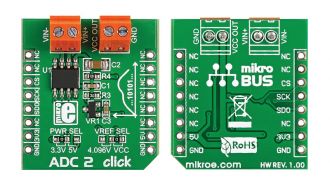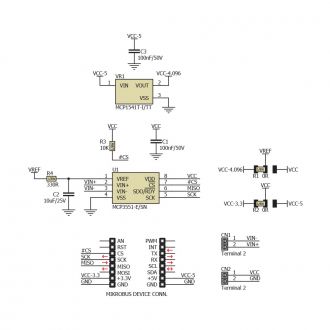
We strongly encourage users to use Package manager for sharing their code on Libstock website, because it boosts your efficiency and leaves the end user with no room for error. [more info]

Rating:
Author: MIKROE
Last Updated: 2019-03-26
Package Version: 1.0.0.1
mikroSDK Library: 1.0.0.0
Category: ADC
Downloaded: 6577 times
Followed by: 4 users
License: MIT license
ADC 2 click carries MCP3551/3, which is a 22-bit ADC with automatic internal offset and gain calibration. This high precision analog-to-digital converter has total unadjusted error of less than 10 ppm, and low-output noise of 2.5 µV RMS. ADC 2 click communicates with the target board through mikroBUS CS, CSK and MISO lines.
Do you want to subscribe in order to receive notifications regarding "ADC 2 click" changes.
Do you want to unsubscribe in order to stop receiving notifications regarding "ADC 2 click" changes.
Do you want to report abuse regarding "ADC 2 click".

Library Description
The library covers all the necessary functions that enables the usage of the ADC 2 click board.
It initializes and defines the SPI driver and drivers that offer functions for reading digital data
and for checking overflow states.
Key functions:
uint8_t adc2_checkOverLow();- Function is used to check overflow low state.Examples Description
The application is composed of three sections:
void applicationTask()
{
adcVal = adc2_adcValueRead();
LongToStr( adcVal, logTxt );
Ltrim( logTxt );
mikrobus_logWrite( "Value : ", _LOG_TEXT );
mikrobus_logWrite( logTxt, _LOG_LINE );
mikrobus_logWrite( "------------------", _LOG_LINE );
Delay_ms( 1000 );
}
Other mikroE Libraries used in the example:
Additional notes and informations
Depending on the development board you are using, you may need USB UART click, USB UART 2 click or RS232 click to connect to your PC, for development systems with no UART to USB interface available on the board. The terminal available in all MikroElektronika compilers, or any other terminal application of your choice, can be used to read the message
